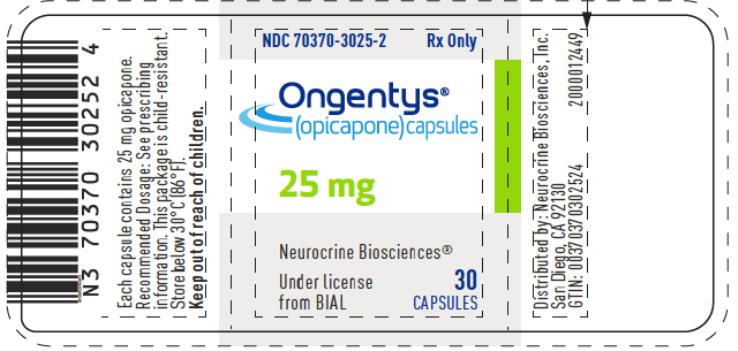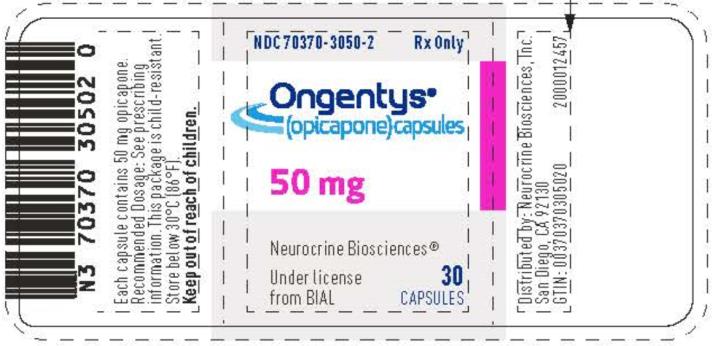Ongentys
Generic name: opicapone
Drug class: Dopaminergic antiparkinsonism agents
Medically reviewed by A Ras MD.
What is Ongentys?
Ongentys is a prescription medicine used with levodopa and carbidopa in people with Parkinson’s disease (PD) who have “OFF” episodes.
It is not known if Ongentys is safe and effective in children.
Description
Ongentys contains opicapone, a peripheral, selective and reversible catechol-O-methyltransferase (COMT) inhibitor. The chemical name of opicapone is 2,5-dichloro-3-(5-(3,4-dihydroxy-5-nitrophenyl)-1,2,4-oxadiazol-3-yl)-4,6-dimethylpyridine-1-oxide with the following structure:

The opicapone molecular formula is C15H10Cl2N4O6; and its molecular weight is 413.17.
Opicapone is a yellow powder/crystalline solid with limited aqueous solubility.
Ongentys capsules are intended for oral administration. Each capsule contains 25 mg or 50 mg of opicapone. ONGENTYS also contains the following inactive ingredients: lactose, magnesium stearate, pregelatinized starch, and sodium starch glycolate. The capsule shells contain: FD&C Blue#2, FD&C Red#3, gelatin, and titanium dioxide.
Mechanism of Action
Opicapone is a selective and reversible inhibitor of catechol-O-methyltransferase (COMT).
COMT catalyzes the transfer of the methyl group of S-adenosyl-L-methionine to the phenolic group of substrates that contain a catechol structure. Physiological substrates of COMT include DOPA, catecholamines (dopamine, norepinephrine, and epinephrine), and their hydroxylated metabolites. When decarboxylation of levodopa is prevented by carbidopa, COMT becomes the major metabolizing enzyme for levodopa, catalyzing its metabolism to 3-methoxy-4-hydroxy-L-phenylalanine (3-OMD).
Who should not take Ongentys?
Do not take Ongentys if you:
- take a type of medicine called a non-selective monoamine-oxidase (MAO) inhibitor, such as phenelzine, isocarboxazid, or tranylcypromine. Ask your healthcare provider or pharmacist if you are taking a non-selective MAO inhibitor.
- have a tumor that secretes hormones known as catecholamines. These tumors include pheochromocytoma (a type of adrenal gland tumor) and paraganglioma.
What should I tell my healthcare provider before taking Ongentys?
Before taking Ongentys, tell your healthcare provider about all of your medical conditions, including if you:
- have daytime sleepiness from a sleep disorder, have unexpected or unpredictable periods of sleep or sleepiness, take a medicine to help you sleep, or take any medicine that makes you feel sleepy.
- have or have had intense urges or unusual behaviors, including gambling, increased sex drive, binge eating, or compulsive shopping.
- have a history of uncontrolled sudden movements (dyskinesia).
- have or have had hallucinations or psychosis.
- have liver problems.
- have kidney problems.
- are pregnant or plan to become pregnant. It is not known if Ongentys will harm your unborn baby.
- are breastfeeding or plan to breastfeed. It is not known if Ongentys passes into breast milk. You and your healthcare provider should decide the best way to feed your baby if you take Ongentys.
Tell your healthcare provider about all the medicines you take, including prescription and over-the-counter medicines, vitamins, and herbal supplements. Especially tell your healthcare provider if you take nonselective MAO inhibitors (such as phenelzine, tranylcypromine, and isocarboxazid) or catecholamine medicines (such as isoproterenol, epinephrine, norepinephrine, dopamine, and dobutamine), regardless of how you take the medicine (by mouth, inhaled, or by injection).
Ongentys and other medicines may affect each other causing side effects. Ongentys may affect the way other medicines work, and other medicines may affect how Ongentys works.
Know the medicines you take. Keep a list of them to show your healthcare provider and pharmacist when you get a new medicine.
How should I take Ongentys?
- Take Ongentys exactly as your healthcare provider tells you to.
- Ongentys should be taken 1 time each day at bedtime.
- Do not eat 1 hour before taking Ongentys and do not eat for at least 1 hour after taking Ongentys.
- If you miss a dose, take your usual dose of Ongentys on the next day at bedtime.
- Do not stop taking Ongentys or change your dose before talking to your healthcare provider.
- Your dose of other Parkinson’s disease medicines may change when stopping Ongentys. Tell your healthcare provider if you have symptoms of withdrawal such as fever, confusion, or severe muscle stiffness.
- If you take too much Ongentys, call your healthcare provider or Poison Control Center at 1-800-222-1222, or go to the nearest hospital emergency room right away.
What should I avoid while taking Ongentys?
- Do not drive, operate machinery, or do other dangerous activities until you know how Ongentys affects you.
What are the possible side effects of Ongentys?
Ongentys may cause serious side effects, including:
- Falling asleep during normal activities. You may suddenly fall asleep while doing normal activities such as driving a car, talking or eating while taking Ongentys or other medicines used to treat Parkinson’s disease, without being drowsy or without warning. This may result in having accidents. Your chances of falling asleep while doing normal activities while taking Ongentys are higher if you take other medicines that cause drowsiness.
- Low blood pressure or dizziness. Low blood pressure, dizziness, light headedness, or fainting can happen with Ongentys. Tell your healthcare provider if you become dizzy, lightheaded, or faint while taking Ongentys.
- Uncontrolled sudden movements (dyskinesia). Ongentys may cause uncontrolled sudden movements or make such movements you already have worse or happen more often. Tell your healthcare provider if this happens.
- Seeing, hearing, believing, or feeling things that are not real or not true. Taking Ongentys may cause seeing, hearing, or feeling things that are not real (hallucinations), believing things that are not real (delusions), or aggressive behavior. Tell your healthcare provider if you have any of these changes in your behavior.
- Unusual urges (impulse control and compulsive disorders). Some people taking Ongentys may get urges to behave in a way unusual for them. Examples of this are unusual urges to gamble, increased sexual urges, strong urges to spend money, binge eating, and the inability to control these urges. If you or your family notice that you are developing any unusual behaviors, talk to your healthcare provider.
Tell your healthcare provider if you experience any of these side effects.
The most common side effects of Ongentys include:
- uncontrolled sudden movements (dyskinesia)
- constipation
- increase in a certain enzyme called blood creatine kinase
- low blood pressure
- weight loss
These are not all of the possible side effects of Ongentys. Call your healthcare provider for medical advice about side effects. You may report side effects to FDA at 1-800-FDA-1088.
General information about the safe and effective use of Ongentys
Medicines are sometimes prescribed for purposes other than those listed in a Patient Information leaflet. Do not use Ongentys for a condition for which it was not prescribed. Do not give Ongentys to other people, even if they have the same symptoms that you have. It may harm them. You can ask your pharmacist or healthcare provider for information about Ongentys that is written for health professionals.
How should I store Ongentys?
- Store Ongentys at a temperature below 86°F (30°C).
- Keep Ongentys and all medicines out of the reach of children.
What are the ingredients in Ongentys?
Active ingredient: opicapone
Inactive ingredients: lactose, magnesium stearate, pregelatinized starch, and sodium starch glycolate.
The capsule shells contain: FD&C Blue#2, FD&C Red#3, gelatin, and titanium dioxide.
Label
PRINCIPAL DISPLAY PANEL
- PRINCIPAL DISPLAY PANEL
- NDC 70370-3025-2
- Ongentys®
- (opicapone) capsules
- 25 mg
- 30 Capsules
- Rx only

PRINCIPAL DISPLAY PANEL
- PRINCIPAL DISPLAY PANEL
- NDC 70370-3050-2
- Ongentys®
- (opicapone) capsules
- 50 mg
- 30 Capsules
- Rx only
